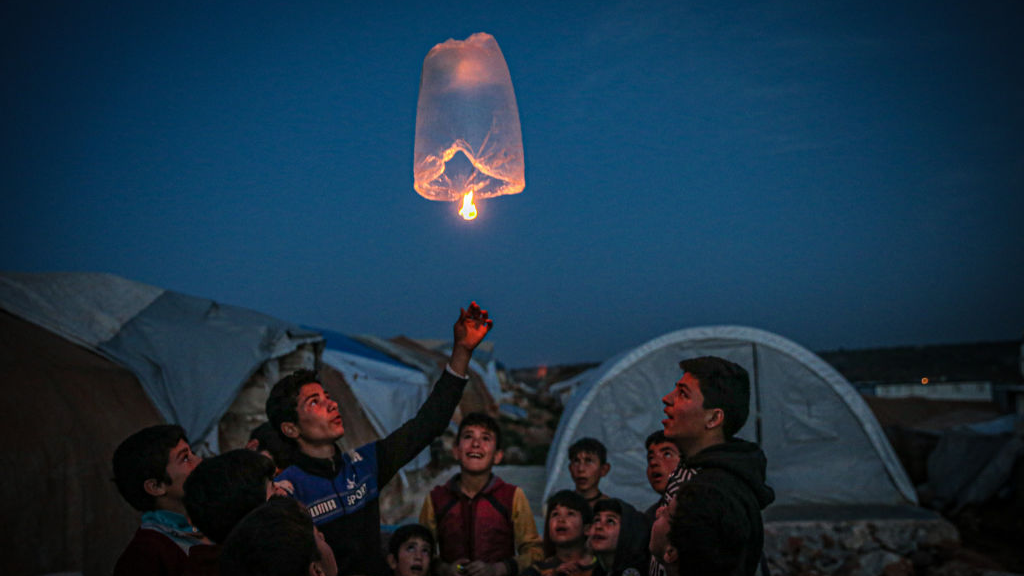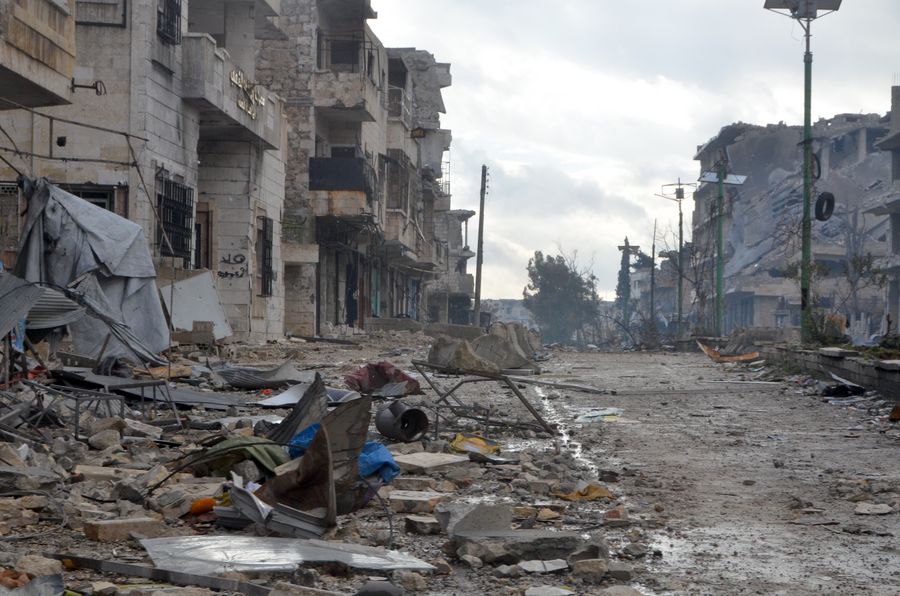
Syrian children living in makeshift tents light sky lanterns as the civil war in Syria enters its 11th year in Betinte village of Idlib, Syria, March 11, 2021. /Getty
Syrian children living in makeshift tents light sky lanterns as the civil war in Syria enters its 11th year in Betinte village of Idlib, Syria, March 11, 2021. /Getty
Editor's Note: Dr. Wang Jin is a research fellow of Charhar Institute in China and an associate Professor from Northwest University in China. The article reflects the author's opinions, and not necessarily the views of CGTN.
When the Syria crisis broke out in March 2011, many observers once believed that Syria was a part of Arab Spring, and held opinions that Syria would witness political transformation as what has happened in Tunisia, Libya and Egypt.
However, after a decade of civil war, Syria has become the center of Middle Eastern instabilities and competitions. The solution to solve the Syrian crisis is still difficult to find, given that there are many obstacles both inside and outside Syria. In the near future, no one can see an end for the unrest of Syria.
Syria has witnessed the failure of false illusion of Western interventions. Upholding the slogans of "helping Syrians," "democracy," and "equality," the West started to intervene Syria's internal affairs in early 2011, and turned the Syrian crisis into an international battlefield.
However, after a decade of conflict, the interests of interventions from the West have largely declined, while humanitarian assistance and support from the West are very limited.
The Syria crisis suggests the urgent needs of international assistance. After a decade of civil war, nearly 5.5 million Syrians fled to other states, while another 6 million Syrians were forced to leave their hometowns and find new lives in other cities and provinces inside Syria. International assistance is far from enough to help refugees both inside and outside Syria. Peace-building efforts must focus on building viable livelihoods for the poorest families as well as supporting communities to become more resilient. International supports are highly and urgently needed.
Syria crisis continues its deadlock situation. The unity of the country is challenged by local militias and administrations in northern Syria. Rebels hold parts of the state's territory and established local administrations and councils. Rebels and opposition groups do not recognize the legitimacy of Syrian government, while the Syrian government perceives rebels as "terrorists." This has become the major obstacle for internal unity and prevents political reconciliations.

Destructed buildings are seen in Maarat al-Numan, the second largest city in Idlib Province in northwestern Syria, January 30, 2020. /Xinhua
Destructed buildings are seen in Maarat al-Numan, the second largest city in Idlib Province in northwestern Syria, January 30, 2020. /Xinhua
The political solution for Syria crisis faces obstacles. The divisions among major parties of Syrian issue are salient. Russia hopes to help reach agreements between Syrian government and opposition groups, while the U.S. and Europe encourage Syrian opposition groups to reject the legitimacy of the Syrian government. Political dialogues between the Syrian government and opposition groups are difficult to make breakthroughs.
The divisions outside Syria make the future reconciliations inside difficult. The diplomatic solution for Syria crisis is hindered by divisions. Organized by the UN and major powers in and out the region, the international society hopes to find ways to end the Syrian crisis from diplomatic channel. These include three major diplomatic mechanisms, namely the Geneva Peace Process organized by UN, the Nur Sultan Peace Process organized by Russia, Turkey and Iran, and the Sochi Peace Process organized by Russia.
Although diplomatic mechanisms may help bring powers together, different powers have different concerns. Russia calls upon all foreign troops' withdrawal from Syria, the U.S. hopes to maintain its military presence in northern and southern Syria, and Turkey protects the rebel groups in northwestern Syria. The clashes between major powers further complicate the situation.
Syrian people are paying the prices for the turmoil. The humanitarian situation continues to deteriorate. Millions of people are forced to leave their homeland to seek refuge in neighboring states and Europe, while Syrian people at home are suffering collapsing economy, food shortage, education deprivation, and the devastating impact of the COVID-19 pandemic.
Syria crisis has become one of the worst crisis in the Middle East since the end of World War II, and the U.S. and EU-multilayered sanctions severed the reconstruction efforts inside Syria. Syria should not be forgotten and ignored, while the decade-long tragedy should not be repeated.
(If you want to contribute and have specific expertise, please contact us at opinions@cgtn.com.)

